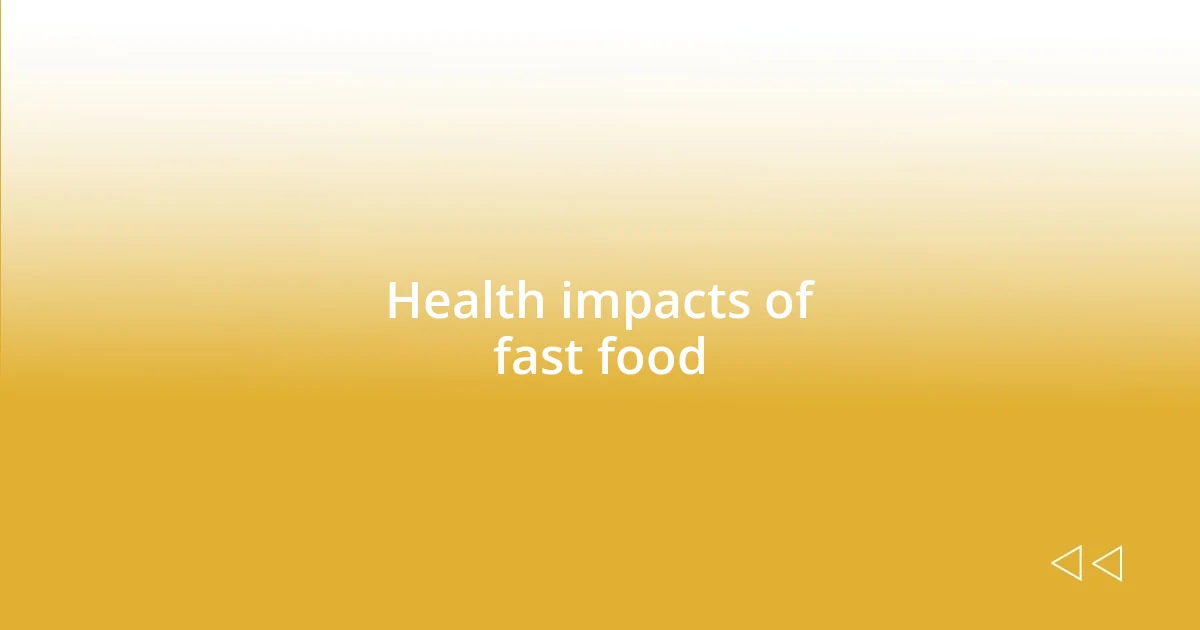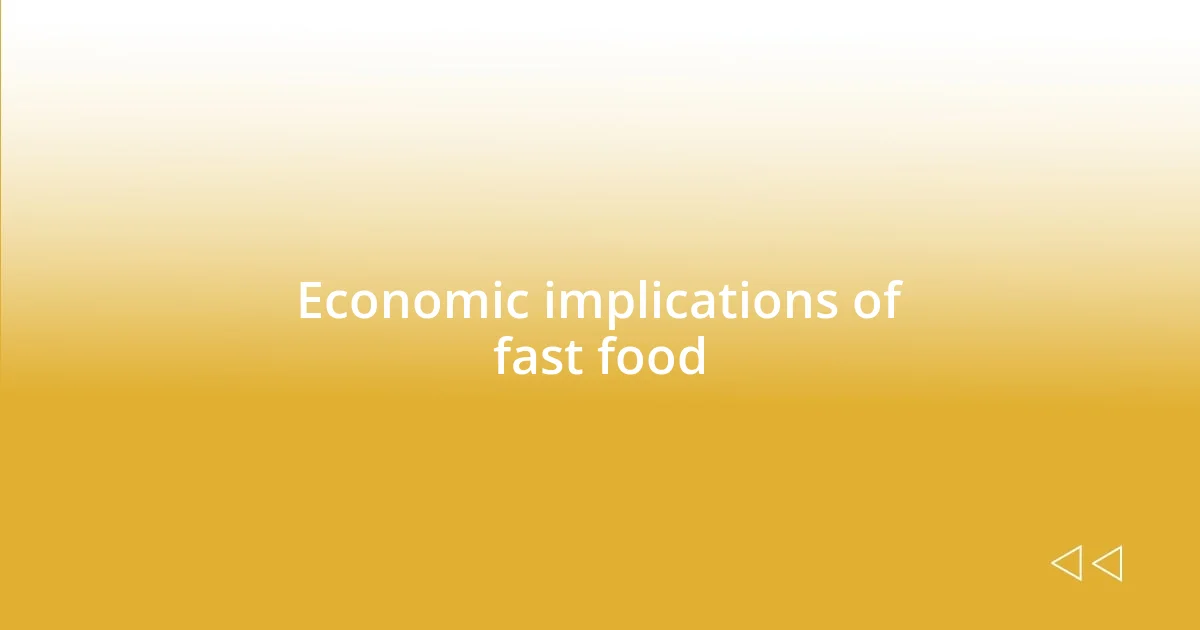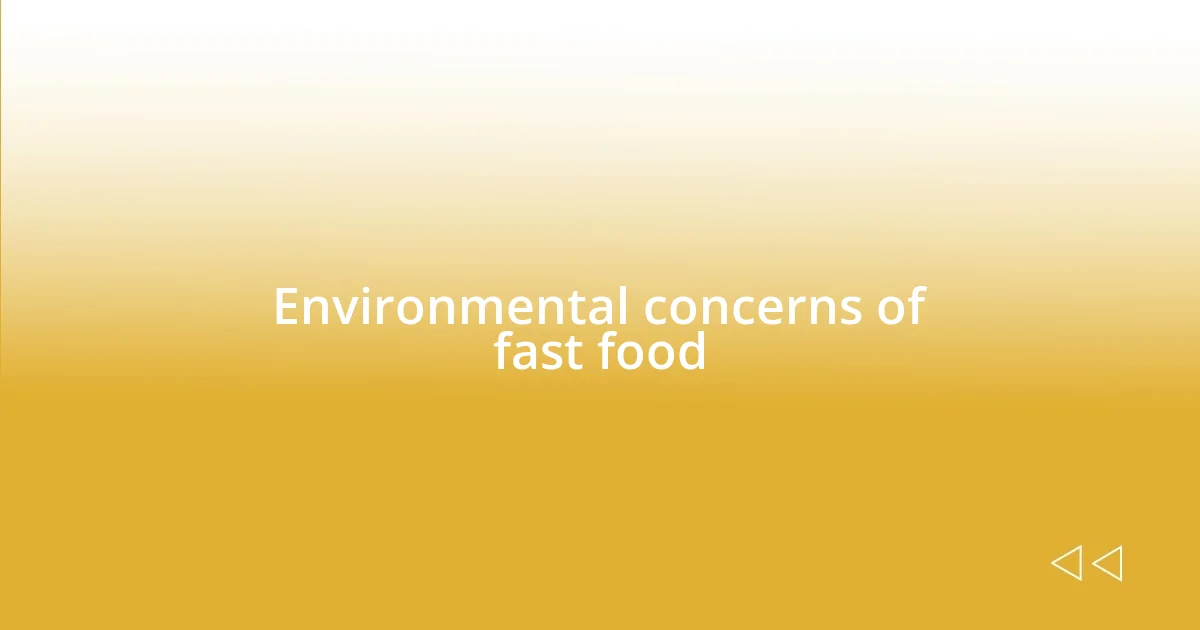Key takeaways:
- Fast food culture combines convenience and community, prompting reflection on the trade-offs between quick meals and the nutritional value of food.
- Fast food has significant health impacts, including obesity, heart disease, and nutritional deficiencies, often exacerbated by frequent consumption.
- The fast food industry affects the economy by providing low-wage jobs and influencing local businesses, while also contributing to environmental concerns like excessive waste and resource depletion.

Understanding fast food culture
Fast food culture is an intriguing blend of convenience and indulgence that has reshaped our eating habits. I remember those late nights in college when a drive-thru felt like a lifeline—a quick fix to satiate hunger without using up valuable study time. Isn’t it fascinating how a simple burger can evoke such nostalgia and comfort?
As fast food envelops our lives, it brings with it a unique sense of community. I often found myself sharing fries with friends after a long day, creating memories in those brightly lit dining areas. But have you ever paused to consider what this means? Are we, in our quest for connection, trading substance for speed?
The marketing prowess behind fast food is another layer worth exploring. I’ve noticed how those colorful ads and catchy jingles can make an unassuming menu item seem irresistible. What draws us in—hunger or the allure of effortlessly fitting in? As we navigate this culture, it’s crucial to reflect on how these choices impact not just our health but also our relationships with food and each other.

Health impacts of fast food
Fast food offers a quick meal option, but the health impacts can be significantly adverse. I still remember the time I indulged in a double cheeseburger and fries after a hectic week, only to feel sluggish and heavy for hours afterward. It’s a common outcome. Fast food tends to be high in calories, saturated fats, sugars, and sodium, contributing to serious health issues over time.
Here are some notable health impacts associated with fast food consumption:
- Obesity Risk: Regular intake of calorie-dense fast food can lead to weight gain.
- Heart Disease: High saturated fat and trans fat levels can raise cholesterol, increasing heart disease risk.
- Diabetes: Elevated sugar and carbohydrate levels in fast food may lead to insulin resistance, elevating diabetes risk.
- Digestive Issues: Low fiber content can result in constipation and other gastrointestinal discomforts.
- Nutritional Deficiencies: Fast food often lacks essential nutrients, making it difficult to meet daily dietary requirements.
When I think back to those impulsive choices, I regret not considering how fast food, while satisfying in the moment, can create longer-term health repercussions. Eating out frequently can create imbalances in our diets, and the ease can often overshadow the importance of nourishing our bodies properly.

Economic implications of fast food
Fast food significantly impacts the economy, creating a unique interplay between convenience and cost. I remember my first job in high school, where we frequented a fast food joint during lunch breaks. It was a budget-friendly option that enabled us to socialize and still have money left for weekend plans. This accessibility is what fast food restaurants capitalize on—they thrive on affordability and speed, making them popular, especially among students and busy professionals.
On a larger scale, the fast-food industry generates billions in revenue each year, but it also influences employment patterns. I’ve seen friends take on jobs at these establishments, often as a stepping stone toward better opportunities. However, many fast food workers earn minimum wage, often devoid of benefits like health insurance. This economic reality prompts a deeper conversation about living wages and worker rights within the fast-food sector.
Moreover, the expansion of fast food chains shapes local economies. I recall visiting my small hometown years later and noticing a new fast food outlet where a beloved local diner once thrived. It’s bittersweet—while these chains generate significant tax revenue, they can stifle local business, shifting consumer spending behaviors and eroding community dining culture. This presents a pivotal question: Is convenience worth the loss of local flavor and employment diversity?
| Aspect | Details |
|---|---|
| Employment Opportunities | Fast food creates many entry-level jobs, but often with low pay and limited benefits. |
| Economic Growth | Fast food contributes billions to the economy, driving growth but also raising questions about living wages. |
| Impact on Local Businesses | Chain restaurants often eclipse local eateries, changing spending habits and community dynamics. |

Environmental concerns of fast food
Fast food certainly takes a toll on our environment, which is something I’ve come to realize more deeply over time. For instance, the sheer volume of packaging used—think about all those bags, wrappers, and containers that end up in landfills each day. It’s shocking when I reflect on how often I’ve finished a meal, only to look around at the mountain of waste generated by just a few minutes of convenience. The production practices for the meat and ingredients, driven by intense demand, often lead to deforestation and habitat destruction as well, which feels like a painful trade-off for a quick bite.
Have you ever considered the carbon footprint associated with fast food? I think back on times when my friends and I opted for drive-thru meals while chatting animatedly in the car. It seemed harmless then, but every drive-thru order contributes to emissions from idling vehicles. These moments, once filled with carefree laughter, now remind me how our choices directly impact the air we breathe. The reality of fast food’s environmental effects makes me question whether the convenience is truly worth the environmental cost we’re imposing.
Water usage is another crucial concern, especially given the droughts some regions face today. Fast food chains tend to demand massive amounts of water for meat production, contributing to resource depletion. I once watched a documentary that highlighted a farming practice where water was being compromised, and it stuck with me. It’s alarming to think that each burger or chicken sandwich may be associated with unsustainable practices that could threaten local water supplies. What does that say about our modern food culture, when a moment of indulgence can lead to larger environmental consequences? These reflections make me reconsider how I can align my food choices with my values toward sustainability.

Personal reflections on fast food
Reflecting on my relationship with fast food, I can remember the thrill of grabbing a burger and fries after a late-night study session. The bright lights of the drive-thru felt like a beacon of comfort amid the stress. Yet, looking back, I realize that those moments often came at a cost—health-wise and financially. I can’t help but wonder: Were those late-night indulgences really worth the energy dips and the regrettable fast food cravings that followed?
I’ve had my share of fast food experiences, and they often left me feeling conflicted. For instance, I recall visiting a fast food restaurant with friends, laughing and enjoying our meals. But as I sat there, surrounded by shiny packaging and plastic cutlery, I felt a pang of guilt. Was we choosing convenience over conscious consumption? The plastic waste we created that night lingered in my mind, making me rethink the ease of grabbing a quick bite on the go.
Every time I indulge in fast food, I find myself questioning my choices. It’s almost a ritual—scanning the menu, weighing my hunger against my values. I still remember when I tried to switch to healthier options on the menu, only to realize that the healthier choices were often more expensive and less satisfying. It makes me reflect on how our food systems often prioritize price and convenience over health and sustainability. It leaves me wondering: How can we strike that balance between enjoying fast food while staying true to our commitment to healthier living?












